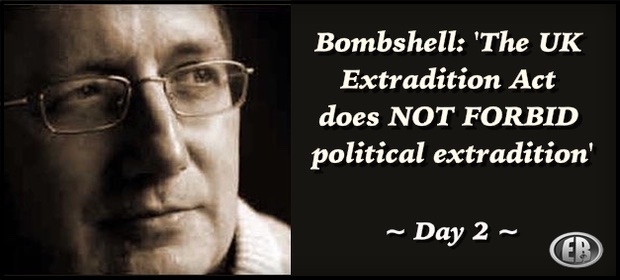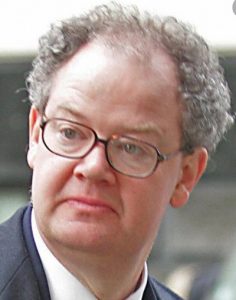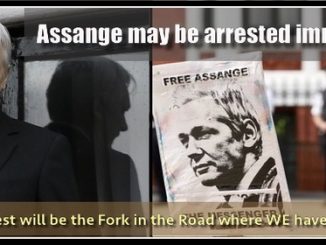
Your Man in the Public Gallery – Assange Hearing Day 2
CRAIG MURRAY
 searched, eleven times been handcuffed, and five times been locked up in different holding cells. On top of this, all of his court documents had been taken from him by the prison authorities, including privileged communications between his lawyers and himself, and he had been left with no ability to prepare to participate in today’s proceedings.
searched, eleven times been handcuffed, and five times been locked up in different holding cells. On top of this, all of his court documents had been taken from him by the prison authorities, including privileged communications between his lawyers and himself, and he had been left with no ability to prepare to participate in today’s proceedings. to have a fair hearing, and that he could confirm that what the defence were suggesting was normal practice. Even then, Baraitser still refused to intervene with the prison. She stated that if the prison conditions were so bad as to reach the very high bar of making a fair hearing impossible, the defence should bring a motion to dismiss the charges on those grounds. Otherwise they should drop it.
to have a fair hearing, and that he could confirm that what the defence were suggesting was normal practice. Even then, Baraitser still refused to intervene with the prison. She stated that if the prison conditions were so bad as to reach the very high bar of making a fair hearing impossible, the defence should bring a motion to dismiss the charges on those grounds. Otherwise they should drop it.A last small incident for me to recount: having queued again from the early hours, I was at the final queue before the entrance to the public gallery, when the name was called out of Kristin Hrnafsson (pictured), editor of  Wikileaks, with whom I was talking at the time. Kristin identified himself, and was told by the court official he was barred from the public gallery.
Wikileaks, with whom I was talking at the time. Kristin identified himself, and was told by the court official he was barred from the public gallery.
Now I was with Kristin throughout the entire proceedings the previous day, and he had done absolutely nothing amiss – he is rather a quiet gentleman. When he was called for, it was by name and by job description – they were specifically banning the editor of Wikileaks from the trial. Kristin asked why and was told it was a decision of the Court.
At this stage John Shipton (pictured below), Julian’s father, announced that in this case the family members would all leave too, and they did so, walking out of the building. They and others then started tweeting the news of the family walkout. This appeared to cause some consternation among court officials, and fifteen minutes later Kristin was re-admitted. We  still have no idea what lay behind this. Later in the day journalists were being briefed by officials it was simply over queue-jumping, but that seems improbable as he was removed by staff who called him by name and title, rather than had spotted him as a queue-jumper.
still have no idea what lay behind this. Later in the day journalists were being briefed by officials it was simply over queue-jumping, but that seems improbable as he was removed by staff who called him by name and title, rather than had spotted him as a queue-jumper.
None of the above goes to the official matter of the case. All of the above tells you more about the draconian nature of the political show-trial which is taking place than does the charade being enacted in the body of the court. There were moments today when I got drawn in to the court process and achieved the suspension of disbelief you might do in theatre, and began thinking “Wow, this case is going well for Assange”. Then an event such as those recounted above kicks in, a coldness grips your heart, and you recall there is no jury here to be convinced. I simply do not believe that anything said or proved in the courtroom can have an impact on the final verdict of this court.
So to the actual proceedings in the case.
For the defence, Mark Summers QC (pictured) stated that the USA charges were entirely dependent on three factual accusations of Assange’s behviour:
 1) Assange helped Manning to decode a hash key to access classified material.
1) Assange helped Manning to decode a hash key to access classified material.
Summers stated this was a provably false allegation from the evidence of the Manning court-martial.
2) Assange solicited the material from Manning.
Summers stated this was provably wrong from information available to the public
3) Assange knowingly put lives at risk.
Summers stated this was provably wrong both from publicly available information and from specific involvement of the US government.
In summary, Summers stated the US government knew that the allegations being made were false as to fact, and they were demonstrably made in bad faith. This was therefore an abuse of process which should lead to dismissal of the extradition request. He described the above three counts as “rubbish, rubbish and rubbish”.
Summers then walked through the facts of the case. He said the charges from the USA divide the materials leaked by Manning to Wikileaks into three categories:
a) Diplomatic Cables
b) Guantanamo detainee assessment briefs
c) Iraq War rules of engagement
d) Afghan and Iraqi war logs
Summers then methodically went through a), b), c) and d) relating each in turn to alleged behaviours 1), 2) and 3), making twelve counts of explanation and exposition in all. This comprehensive account took some four hours and I shall not attempt to capture it here. I will rather give highlights, but will relate occasionally to the alleged behaviour number and/or the alleged materials letter. I hope you follow that – it took me some time to do so!
On 1) Summers at great length demonstrated conclusively that Manning had access to each material a) b) c) d) provided to Wikileaks, without needing any code from Assange, and had that access before ever contacting Assange. Nor had Manning needed a code to conceal her identity as the prosecution alleged – the database for intelligence analysts Manning could access – as could thousands of others – did not require a username or password to access it from a work military computer. Summers quoted testimony of several officers from Manning’s court-martial to confirm this. Nor would breaking the systems admin code on the system give Manning access to any additional classified databases. Summers quoted evidence from the Manning court-martial, where this had been accepted, that the reason Manning wanted to get in to systems admin was to allow soldiers to put their video-games and movies on their government laptops, which in fact happened frequently.
Magistrate Baraitser twice made major interruptions. She observed that if Chelsea Manning did not know she could not be traced as the user who downloaded the databases, she might have sought Assange’s assistance to crack a code to conceal her identity from ignorance she did not need to do that, and to assist would still be an offence by Assange.
Summers pointed out that Manning knew that she did not need a username and password, because she actually accessed all the materials without one. Baraitser replied that this did not constitute proof she knew she could not be traced. Summers said in logic it made no sense to argue that she was seeking a code to conceal her user ID and password, where there was no user ID and password. Baraitser replied again he could not prove that. At this point Summers became somewhat testy and short with Baraitser, and took her through the court martial evidence again. Of which more…
Baraitser also made the point that even if Assange were helping Manning to crack an admin code, even if it did not enable Manning to access any more databases, that still was unauthorised use and would constitute the crime of aiding and abetting computer misuse, even if for an innocent purpose.
After a brief break, Baraitser came back with a real zinger. She told Summers that he had presented the findings of the US court martial of Chelsea Manning as fact. But she did not agree that her court had to treat evidence at a US court martial, even agreed or uncontested evidence or prosecution evidence, as fact. Summers replied that agreed evidence or prosecution evidence at the US court martial clearly was agreed by the US government as fact, and what was at issue at the moment was whether the US government was charging contrary to the facts it knew. Baraitser said she would return to her point once witnesses were heard.
Baraitser was no making no attempt to conceal a hostility to the defence argument, and seemed irritated they had the temerity to make it. This burst out when discussing c), the Iraq war rules of engagement. Summers argued that these had not been solicited from Manning, but had rather been provided by Manning in an accompanying file along with the Collateral Murder video that showed the murder of Reuters journalists and children. Manning’s purpose, as she stated at her court martial, was to show that the Collateral Murder actions breached the rules of engagement, even though the Department of Defense claimed otherwise. Summers stated that by not including this context, the US extradition request was deliberately misleading as it did not even mention the Collateral Murder video at all.
At this point Baraitser could not conceal her contempt. Try to imagine Lady Bracknell saying “A Handbag” or “the Brighton line”, or if your education didn’t run that way, try to imagine Pritti Patel spotting a disabled immigrant. This is a literal quote:
“Are you suggesting, Mr Summers, that the authorities, the Government, should have to provide context for its charges?”
An unfazed Summers replied in the affirmative and then went on to show where the Supreme Court had said so in other extradition cases. Baraitser was showing utter confusion that anybody could claim a significant distinction between the Government and God.
The bulk of Summers’ argument went to refuting behaviour 3), putting lives at risk. This was only claimed in relation to materials a) and d). Summers described at great length the efforts of Wikileaks with media partners over more than a year to set up a massive redaction campaign on the cables. He explained that the unredacted cables only became available after Luke Harding and David Leigh of the Guardian published the password to the cache as the heading to Chapter XI of their book Wikileaks, published in February 2011.
Nobody had put 2 and 2 together on this password until the German publication Die Freitag had done so and announced it had the unredacted cables in August 2011. Summers then gave the most powerful arguments of the day.
The US government had been actively participating in the redaction exercise on the cables. They therefore knew the allegations of reckless publication to be untrue.
Once Die Freitag announced they had the unredacted materials, Julian Assange and Sara Harrison instantly telephoned the White House, State Department and US Embassy to warn them named sources may be put at risk. Summers read from the transcripts of telephone conversations as Assange and Harrison attempted to convince US officials of the urgency of enabling source protection procedures – and expressed their bafflement as officials stonewalled them. This evidence utterly undermined the US government’s case and proved bad faith in omitting extremely relevant fact. It was a very striking moment.
With relation to the same behaviour 3) on materials d), Summers showed that the Manning court martial had accepted that these materials contained no endangered source names, but showed that Wikileaks had activated a redaction exercise anyway as a “belt and braces” approach.
There was much more from the defence. For the prosecution, James Lewis indicated he would reply in depth later in proceedings, but wished to state that the prosecution does not accept the court martial evidence as fact, and particularly does not accept any of the “self-serving” testimony of Chelsea Manning, whom he portrayed as a convicted criminal falsely claiming noble motives. The prosecution generally rejected any notion that this court should consider the truth or otherwise of any of the facts; those could only be decided at trial in the USA.
Then, to wrap up proceedings, Baraitser dropped a massive bombshell. She stated that although Article 4.1 of the US/UK Extradition Treaty forbade political extraditions, this was only in the Treaty. That exemption does not appear in the UK Extradition Act. On the face of it, therefore political extradition is not illegal in the UK, as the Treaty has no legal force on the Court. She invited the defence to address this argument in the morning.
It is now 06.35am and I am late to start queuing…
With grateful thanks to those who donated or subscribed to make this reporting possible.
This article is entirely free to reproduce and publish, including in translation, and I very much hope people will do so actively. Truth shall set us free.
************
Original article

••••
The Liberty Beacon Project is now expanding at a near exponential rate, and for this we are grateful and excited! But we must also be practical. For 7 years we have not asked for any donations, and have built this project with our own funds as we grew. We are now experiencing ever increasing growing pains due to the large number of websites and projects we represent. So we have just installed donation buttons on our websites and ask that you consider this when you visit them. Nothing is too small. We thank you for all your support and your considerations … (TLB)
••••
Comment Policy: As a privately owned web site, we reserve the right to remove comments that contain spam, advertising, vulgarity, threats of violence, racism, or personal/abusive attacks on other users. This also applies to trolling, the use of more than one alias, or just intentional mischief. Enforcement of this policy is at the discretion of this websites administrators. Repeat offenders may be blocked or permanently banned without prior warning.
••••
Disclaimer: TLB websites contain copyrighted material the use of which has not always been specifically authorized by the copyright owner. We are making such material available to our readers under the provisions of “fair use” in an effort to advance a better understanding of political, health, economic and social issues. The material on this site is distributed without profit to those who have expressed a prior interest in receiving it for research and educational purposes. If you wish to use copyrighted material for purposes other than “fair use” you must request permission from the copyright owner.
••••
Disclaimer: The information and opinions shared are for informational purposes only including, but not limited to, text, graphics, images and other material are not intended as medical advice or instruction. Nothing mentioned is intended to be a substitute for professional medical advice, diagnosis or treatment.




